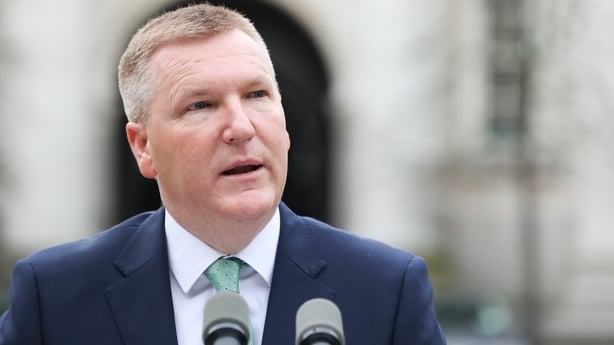Businesses have been warned by the Minister for Public Expenditure that the Government wants to see any fall in production costs passed on to consumers quickly.
Paschal Donohoe said higher levels of profitability will be monitored closely to ensure that no part of the economy is profiteering from inflation.
The minister said that while there are some positive signs that inflation trends are going in the right direction, it was not a cause for celebration.
This is because the cost of groceries and "filling up a tank of diesel" is still too high, he said.
"If the cost of making something, if the cost of supplying services, if the cost of keeping somebody's house warm, if the cost of that is beginning to fall, and there are clear signs it is beginning to, that has to be passed on to the consumer at the earliest opportunity," Mr Donohoe added.
The minister also said he hoped that a new public service pay agreement can be agreed this year.
However, he was unable to give a commitment that negotiations would be concluded ahead of the Budget in October.
Earlier the Minister for Finance said the Government does not set the prices being charged at a retail level, but are bringing forward measures such as a solidarity contribution and other legislation.
Speaking on RTÉ's News at One, Minister McGrath said data shows that we are past the peak of inflation and it is falling.

But he added that what is needed now is to see the actual price levels falling - because that is what really matters to consumers.
New figures from consultants Kantar show the rate of food inflation has dropped slightly for the first time in two years April, while core inflation in the euro zone also slightly cooled last month.
"I know the consumers aren't really yet feeling the benefit of that," Michael McGrath stated.
"And they will want to see the pass through now of savings that are being experienced at a wholesale level in terms of energy for example, coming through to consumers by way of the prices being charged," he added.
The Minister noted that it did not take very long for consumer prices to go up when the wholesale prices moved upwards in the market.
"I do think we need to hear a better explanation and we need more detail from the energy providers in relation to the prices that consumers are being charged because the reductions at the wholesale level actually have been quite dramatic," he said.
We need your consent to load this rte-player contentWe use rte-player to manage extra content that can set cookies on your device and collect data about your activity. Please review their details and accept them to load the content.Manage Preferences
"It is understandable that there would be some lag in the pass through of those wholesale reductions to consumers at a retail level, I do think that we need to begin to see that now - any relief would be welcomed," he said.
Mr McGrath also said a further energy credit will be considered later in the year - based on the market circumstances at the time.
"We are now in the process of preparing the budget - as we move towards the budget in the autumn, we will assess what the position is in relation to inflation at that point in time, what way incomes have moved and what additional support may need to be provided to households and businesses but that is a judgement that we will finalise towards the autumn," he said.
On excise, he said that the Government have provided for a phased restoration of excise from the month of June to October and it will be reviewed in the budget.
He said that if prices remain elevated for a prolonged period of time, the policy response will be at a monetary level and will be higher and higher interest rates.
"It is in the interest of the corporate sector that we remain competitive and that prices are subject to downward pressure," Mr McGrath said.
"Otherwise, the ECB and the other central banks around the world will continue to push interest rates higher and the effect of that then of course, is to dampen economic activity, and it will hold back the growth and development of economies globally," he stated.
"So it is in their interest to be competitive, and to make sure that the consumers benefit from any reductions in costs we're seeing at a wholesale level," he added.
The Minister also said today that it will be next year before windfall tax measures were fully up and running, but a long term savings fund needs to be in place.
He said that plans on relation to what happens with the budget surplus would be set out in the Summer Economic Statement.
"We do already have a national reserve fund with €6 billion in that fund. When I look at the overall level of corporation tax receipts in 2014, it was about €4 billion in 2020," he said.
"It was just under €12 billion this year and we estimate it will be over €24 billion next year - so in effect it has doubled since 2020," he said.
"About six years ago corporation tax was about 15% of total tax receipts. Last year it was 27.5%," he added.
He said that running large budget surpluses was a good news story as it gives the the Government options and an opportunity to make sure that public finances are safer into the

